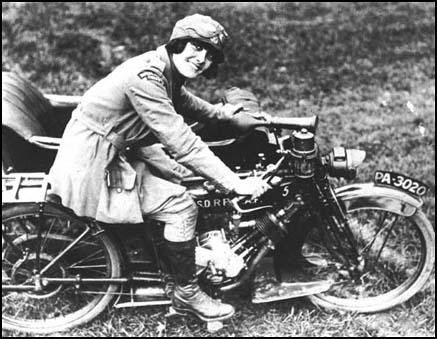Women's Auxiliary Army Corps (WAAC)
With heavy losses on the Western Front in 1916, the British Army became concerned by its reduced number of fighting soldiers. Lieutenant General Sir Henry Lawson suggested to Brigadier General Auckland Geddes, Director of Recruitment at the War Office, that far too many men were doing what he called "soft jobs". After talks with the government it was decided to use women to replace men doing certain administrative jobs in Britain and France. These men could then be sent to fight at the front.
In January 1917, the government announced the establishment of a new voluntary service, the Women's Auxiliary Army Corps (WAAC). The plan was for these women to serve as clerks, telephonists, waitresses, cooks, and as instructors in the use of gas masks. It was decided that women would not be allowed to hold commissions and so that those in charge were given the ranks of controller and administrator. Helen Gwynne-Vaughan was chosen for the important job as the WAAC's Chief Controller (Overseas).
The WAAC uniform consisted of a small, tight-fitting khaki cap, khaki jackets and skirts. Regulations stated that the skirt had to be no more than twelve inches above the ground. To maintain a high standard of fitness, all members of the WAAC had to do physical exercises every day. This included morris dancing and hockey.
Women in the WAAC were not given full military status. The women enrolled rather than enlisted and were punished for breaches of discipline by civil rather than military courts. Women in the WAAC were divided into officials (officers), forewomen (sergeant), assistant forewomen (corporals) and workers (privates). Between January 1917 and the Armistice over 57,000 women served in the WAAC.
Newspapers in Britain began publishing stories claiming that the WAAC in France were becoming too friendly with the soldiers and large numbers were being sent home because they were pregnant. A senior member of the WAAC, Miss Tennyson Jesse, was asked to carry out an official investigation into these stories. In her report, Tennyson Jesse pointed out that between March 1917 to February 1918, of the 6,000 WAACs in France, only 21 became pregnant. Tennyson Jesse argued that this was a lower-rate than in most British villages. Tennyson Jesse proudly pointed out that of all the women serving in France only 37 had been sent home for incompetence or lack of discipline.
Although not on combat duties, members of the WAAC had to endure shelling from heavy artillery and bombing raids by German aircraft. During one attack in April, 1918, nine WAACs were killed at the Etaples Army Camp. British newspapers claimed that it was another example of a German atrocity but Helen Gwynne-Vaughan was quick to point out at a press conference that as the WAAC were in France as replacements for soldiers, the enemy was quite entitled to try and kill them.

Primary Sources
(1) Statement issued by Buckingham Palace in April, 1917.
As a mark of Her Majesty's appreciation of the good services rendered by the WAAC both at home and abroad since its inauguration, and especially of the distinction which it earned in France during the recent fighting on the Western Front, Her Majesty has been graciously pleased to assume the position and title of Commandant-in-Chief of the Corps, which in future will bear the name of Queen Mary's Army Auxiliary Corps.
(2) Major Ronald Schweder, letter (July, 1918)
Latham, one of my Subalterns, came back today after a fortnight's rest cure by the seaside. He was full of WAACs, VADs, etc. It seems to me to be on a friendly footing, the male and female army in the back areas. One might almost call it "matey".
(3) In 1930 a book, The Women's Story of the War was published. The book's anonymous author claimed to have been a WAAC during the First World War.
One became so used to hearing coarse language and filthy stories that one no longer felt even disconcerted. I came several times upon spectacles which before the war would have upset me very much. They made me realise how little removed from animals men and women are.
